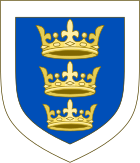Statutes of Kilkenny

|
|
| Long title | A Statute of the Fortieth Year of King Edward III., enacted in a parliament held in Kilkenny, A.D. 1367, before Lionel Duke of Clarence, Lord Lieutenant of Ireland. |
|---|---|
| Citation | 40 Edw. 3 |
| Introduced by | The Duke of Clarence |
| Territorial extent | Ireland |
| Dates | |
| Repealed | 1983 |
| Other legislation | |
| Repealed by | Statute Law Revision Act 1983 |
|
Status: Repealed
|
|
| Text of statute as originally enacted | |
The Statutes of Kilkenny were a series of thirty-five acts passed at Kilkenny in 1366, aiming to curb the decline of the Hiberno-Norman Lordship of Ireland.
By the middle decades of the 13th century, the Hiberno-Norman presence in Ireland was perceived to be under threat, mostly due to the dissolution of English laws and customs among English settlers. These English settlers were described as "more Irish than the Irish themselves", referring to their taking up Irish law, custom, costume and language. The introduction to the text of the statutes claim,
Original Anglo-Norman: ... ore plusors Engleis de la dit terre guepissant la lang gis monture leys & usages Engleis vivent et se governement as maniers guise et lang des Irrois enemies et auxiant ount fait divers mariages & aliaunces enter eux et les Irrois enemyes avauntditz dont le dit terre et le lieg people de icelle la lang Engloies ligeance a nostre seignour le Roy Duc et lez leis Engleis illoeques sont mis en subjection et retrets...
... now many English of the said land, forsaking the English language, manners, mode of riding, laws and usages, live and govern themselves according to the manners, fashion, and language of the Irish enemies; and also have made divers marriages and alliances between themselves and the Irish enemies aforesaid; whereby the said land, and the liege people thereof, the English language, the allegiance due to our lord the king, and the English laws there, are put in subjection and decayed...
The statutes tried to prevent this "middle nation", which was neither true English nor Irish, by reasserting English culture among the English settlers.
There were also military threats to the Norman presence, such as the failed invasion by Robert Bruce's brother Edward Bruce in 1315, which was defended by the Irish chief Domhnall Ó Néill in his Remonstrance to Pope John XXII, complaining that "For the English inhabiting our land ... are so different in character from the English of England ... that with the greatest propriety they may be called a nation not of middle medium, but of utmost, perfidy". Further, there was the de Burgh or Burke Civil War of 1333–38, which led to the disintegration of the estate of the Earldom of Ulster into three separate lordships, two of which were in outright rebellion against the crown.
...
Wikipedia
